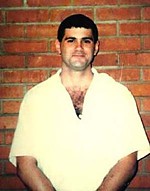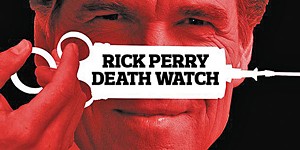Willingham Family Appeals to Third Court
Family hopes to see last week's ruling overturned
By Jordan Smith, Fri., Dec. 31, 2010
In October, Baird heard testimony from two fire experts – brought by lawyers for Willingham's family – during a proceeding seeking to posthumously clear Willingham's name. Baird was to consider whether cause exists to initiate a court of inquiry into the actions (or inaction) of state officials prior to Willingham's death. At issue specifically is whether officials (likely the State Fire Marshal's Office and Gov. Rick Perry) relied on faulty science (and ignored new evidence, clearing the way for Willingham's 2004 execution) to conclude that Willingham set the 1991 fire at his Corsicana home that killed his three young children.
Navarro County District Attorney R. Lowell Thompson had sought to recuse Baird because he believed Baird couldn't be objective on the matter. In turn, Baird refused to rule directly on the motion, instead ruling that Thompson lacked standing to raise the issue and allowing the hearing to proceed. Thompson appealed to the Third Court to halt the proceeding, a stay that came through just after the two-day hearing had concluded – meaning, in effect, that the court would not allow Baird to enter a final ruling.
In the court's opinion, written by Chief Justice Woodie Jones and joined by Justice Bob Pemberton (with Justice David Puryear dissenting), the court concluded that Baird should have recused himself or referred Thompson's motion to the region's presiding judge, Williamson County's Billy Ray Stubblefield, for consideration. In the opinion, Jones concluded that the appellate court had grounds to intervene in the matter and to stay the Willingham hearing, because Baird was sitting as a judge and not as a magistrate considering only whether to open a court of inquiry.
In dissent, Puryear concluded that the hearing was unique and that, ultimately, he didn't believe the Third Court had the standing to intervene. Puryear noted that convening a court of inquiry is a bifurcated process: First, a judge acting as magistrate should consider whether there is probable cause to open an inquiry; second, if there is cause, the region's presiding judge should appoint a district judge to preside over the subsequent inquiry. But if the hearing is in its infancy, during the probable cause phase, the Third Court does not have standing to intervene, he wrote. (Still, Puryear opined that while the judge acting in his magisterial capacity is "authorized" both to "issue an affidavit specifying 'the substantial facts establishing probable cause'" and to request that a hearing be convened, the magistrate is divested of the power to actually call witnesses or hold any hearings in order to establish probable cause. Thus, Puryear opined that in Baird's approach, he was "exercising authority that he does not possess"; interestingly, however, the statute covering the court-of-inquiry proceedings is mute on what powers a magistrate deciding probable cause has or does not have.)
Attorneys for Willingham's family – including Barry Scheck of the Innocence Project, former Gov. Mark White, and San Antonio defender Gerald Goldstein – are asking that all six judges of the Third Court consider whether Jones and Pemberton ruled correctly. Moreover, they note, the question of recusal is moot given Baird's plans to retire his position this week, on Dec. 31. Where that leaves the larger issue – of whether or not a court of inquiry is warranted – remains unclear.
Got something to say on the subject? Send a letter to the editor.










